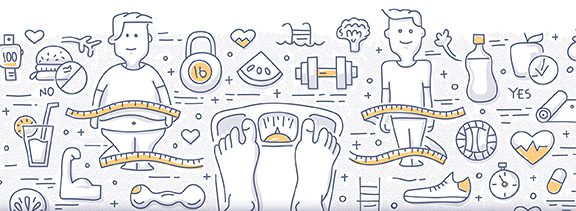
Almost everyone has struggled with weight and body image at some point in their lives. We asked local weight loss medical specialists to talk about how serious the disease of obesity is and share tips on how to stay healthy and fit your entire life. (And of course, we threw in some pop culture to chat about Lizzo and reality TV.)
Participants:
Kashif Anwar, MD, Obesity Medicine Specialist Capital Health
Philip Collins, DO, Weight Management Specialist Rowan Medicine
Rebecca Fraid, DO, Primary Care Physician/ Weight Loss Specialist Inspira Health
Adeshola Fakulujo, MD, Director, Minimally Invasive Surgery Jefferson Health – new jersey
Rohit Patel, MD, Director, Center for Metabolic and Bariatric Surgery Cooper University Health Care
Suzanne Mackey, MD, Co-Founder, Salveo Weight Management
Moderator Marianne Aleardi, Publisher, SJ Magazine
The problem of obesity
The expectation is 50% of Americans will have a BMI (Body Mass Index) of 30 or greater by 2030, which is only 7 years away. And even more important: 20% of adolescents carry a diagnosis of obesity. When an adolescent is obese, it’s likely they will become an adult with progressive obesity.
Suzanne Mackey
Ten years ago, the prevalence of obesity was about 30%. The latest data we have, which is from 2017 to 2018, shows the prevalence is now about 42.4%. The prevalence of obesity is a serious problem.
Adeshola Fakulujo
We’ve made great progress in this country against coronary artery disease, heart attacks and strokes. But those advances are slowing. And a common thread to that is the counteracting influence of the obesity epidemic. We are not seeing the same declines anymore.
Kashif Anwar
Patients coming to my office drive past 6, 7, 8 fast food places and convenience stores. These are calorically dense, fast options for people who don’t have a lot of time to spend preparing foods because they’re taking care of their families, their work and everything else. Evolutionarily, this isn’t how we were supposed to develop.
Philip Collins
 Weight Loss Medications
Weight Loss Medications
We have a number of medication options that, when used appropriately, can be very useful for weight loss and can even help some of the comorbid conditions that we see with obesity. Phentermine has been around since 1959. This is a classic medication that helps suppress your appetite. Some of the newer medications tend to work a little bit better. These are injectable medications given once a day or once a week. They work in a number of ways by decreasing appetite, regulating insulin and glucose, and slowing down how quickly the stomach empties.
Philip Collins
Insurance companies are getting better in terms of approving medications, but they can get away with legally saying this is a cosmetic condition, so they don’t need to cover treatment. Some insurance companies are smarter, but when I have to fill out a prior authorization form to get approval, most insurance companies will ask, “Have you tried this medication?” “Have you tried that medication?” But the 4 or 5 medications I use work completely differently, so the medication treatment I choose is for that individual patient.
Kashif Anwar
By the time patients come to me, many of them are so upset with themselves they’re ready to accept any help. I’m always very honest with them and I explain how the medication works, the potential side effects and why I think it would be appropriate for the patient. I give them the tools they need to understand treatment. They’re very open to this help, because most of them have tried everything.
Rebecca Fraid
In the past, we would use a weight loss medication and as soon as somebody hit their goal, the medication was stopped. But that’s when they’re in the most vulnerable window for weight regain. So people would think: Why use a weight loss drug? You’re just going to regain your weight when you stop. The problem is they stopped too soon, and we didn’t educate the patient on the risk of weight regain, how to prevent weight regain, and that need for longer treatment.
Suzanne Mackey
Medications are part of our toolbox for helping patients who struggle with the disease of obesity. Post-operatively, patients may still struggle long-term with maintaining weight. Medications can help to either make that process easier or make the results more long-lasting.
Rohit Patel
 The patients they see
The patients they see
I see patients from all different walks of life – pediatrics up to people in their 80s and 90s, which I love seeing patients who want to change their life at that stage. A specialist might send someone to me with sleep apnea, diabetes, different cancer diagnoses or even rheumatologic autoimmune diseases. I also see patients who are underweight or they’re really struggling emotionally with their weight. It’s all different types of people.
Rebecca Fraid
I often see referrals from orthopedics, because insurance companies won’t approve a hip or knee replacement at certain BMIs. So a patient will come in needing to be a certain BMI before they can schedule surgery. It’s tough because they’re in pain, which makes exercise very difficult.
Suzanne Mackey
A majority of my patients are middle-aged, but I do see patients from 18 to over 70. Most patients have a recent diagnosis of some medical issue, and they’ve tried losing weight on their own and failed. Others come in saying they’re tired and have difficulty breathing, they can’t play with their children. They feel they’re losing out on life, so they’re ready to consider weight loss surgery.
Adeshola Fakulujo
For many surgeries, sometimes the surgeon won’t operate because they feel the patient is at an unhealthy weight. I’ve seen plastic surgeons, even bariatric surgeons, want to get a patient to a more manageable weight to help ensure surgery is a success with lower complications.
Kashif Anwar
 Advice to parents of children with obesity
Advice to parents of children with obesity
Stay away from focusing on your child’s weight because it is so incredibly hurtful. Approach weight loss with different words: Would you like to feel a little less short of breath when you’re running? Do you want to get better at soccer? Does your knee hurt? The kids will tell you they want to get better, and they’re happy knowing that a very small change can make a huge difference.
Rebecca Fraid
When I talk to adolescents, I try to find some of the core causes of their excess weight and talk about 2 or 3 life changes they can make. I try to get them to focus on their general health and not so much the number.
Kashif Anwar
Model good behavior. One thing I think is very common is using food as a reward. You did good in school, you get ice cream. You cleaned your room, have a piece of cake. You want to avoid the reward/punishment aspect of food.
Philip Collins
If you have parents who are not struggling with obesity, it’s very difficult for them to understand why their child is struggling with obesity when they all eat the same things. So having a conversation about obesity as a disease is important to that parent, so they can better understand why you can all be eating the same thing, and one member of the family is dealing with obesity.
Suzanne Mackey
 Lizzo & body positivity
Lizzo & body positivity
I do understand where she’s coming from – you should love yourself. But loving yourself is not keeping yourself at that same weight, it’s trying to get to a healthy weight. There are some medical conditions that affect obese patients that you can’t detect right away. Fatty liver disease – you don’t see that until about 70-80% of the liver function is gone. Then it’s too late. Obesity does affect the body.
Adeshola Fakulujo
Well first, Lizzo is amazing. She has had great impact talking about things in such an open way to create discussion. For decades, there hasn’t been an opportunity for people to talk about weight – the potential risks of this issue, what it means from a scientific aspect, and then how that correlates to society and how we view our weight. Our weight shouldn’t define us. I’m a strong believer in that. But it also shouldn’t be a stigma that we put on our patients. Providers have a responsibility to lead and create discussion in a healthy way for our patients and society.
Rohit Patel
It’s a very fine line. It’s important to empathize with patients, but at the same time, it’s not a good idea to be at an excess weight. We should focus more on why this is a problem and what help there is. But doctors do such a bad job of this that people like Lizzo and others in that movement have a very negative image of physicians. I’ve been in Facebook groups where my eyes were opened to problems with doctors. Stories of going to the doctor with a physical problem and the doctor says, “Well, you’ve got to lose weight.” That strong distrust of physicians contributes to the mindset of: There’s nothing wrong with us, leave us alone.
Kashif Anwar
It comes down to health. Loving yourself is important, so I like the message of body positivity, but we also have to encourage the health aspect of it.
Rebecca Fraid
 Reality weight loss programs
Reality weight loss programs
In theory, these shows should be great. You would think they would send this great message of getting healthier. But the takeaway of “The Biggest Loser” is you have to work out nonstop and you can only eat a few hundred calories a day. Realistically, that’s not a lifestyle. That’s a diet. You can certainly lose weight with most diets, but they tend not to last.
Philip Collins
This reality is not real life. There, you have a structured exercise program and a chef. How does that translate to real life? It’s not sustainable.
Adeshola Fakulujo
I take what I see on TV with a grain of salt. But these shows raise the opportunity for discussion. Many times, patients ask a question because of something they saw on TV. The media is a very powerful influence, so I appreciate media organizations, like SJ Magazine, who are interested in asking good questions and creating conversation around topics that are true to all of us.
Rohit Patel
 Diet or exercise – what’s most important?
Diet or exercise – what’s most important?
What we put into the tank is going to be more impactful than how many calories we burn. But consistency is probably what’s most important. Be consistent with small changes in diet or consistent with moderate exercise, or both. The combination is what’s really impactful. Being overly biased towards one or the other is not an effective strategy for the long-term.
Rohit Patel
We estimate it’s 80% nutrition and 20% exercise. But we do have to remember our trackers and our wearables tend to overestimate calories burned. If folks are giving themselves back calories for exercise, they need to know those counts tend to be overestimated.
Suzanne Mackey
I will ask a patient, “What is easier for you? Are you able to exercise a certain number of days a week? Are you able to increase your eating frequency, choose more nutritious options, snack prep, meal prep?” So the answer is based on the patient, because if I tell them to exercise and they can’t, well, I just failed them.
Rebecca Fraid
If I had to choose, I would say nutrition would be the bigger component to focus on for most people. When people ask about exercise, they’re usually focusing on dedicated exercise – getting on the treadmill or going to the gym. But in reality, you just need physical activity. For someone who is more sedentary, if they’re able to increase physical activity on a daily basis, that can make a big difference.
Philip Collins
You can exercise all you want, but if you eat the wrong things, it’s not going to help, so while I advocate both, I would have to pick diet.
Adeshola Fakulujo
Sometimes patients use exercise so they don’t have to change what they’re eating. “Oh, I’m going to burn off this pizza when I play tennis later.” That’s a big issue.
Kashif Anwar
Intermittent fasting
The data we’re getting is very promising, but for certain people. I used to tell all my patients that breakfast was the most important meal of the day. Now I’m not so sure. There’s plenty of people I’ve seen who have a normal weight and are generally healthy, who don’t need a big breakfast. And that’s ok, as long as you’re still making healthy choices.
Kashif Anwar
It’s been shown to work, but the question is: Is it sustainable? When you break your fast, how much do you eat? It may be easy to do for a month, 2 months. But is it sustainable?
Adeshola Fakulujo
It has its place for certain patients. Some patients are already intermittent fasting without even trying. They skip breakfast, have lunch at 12 and then eat a large dinner.
Rebecca Fraid
I like to ask patients, “What’s in your coffee?” They may be intermittent fasting, but they put 4 or 5 Splenda in their coffee. There is concern that artificial sweeteners drive some insulin and some weight gain, so they might be totally mitigating their intermittent fasting. And then if they come to lunch and they’re starving, they could have a hard time controlling portions. That can be problematic as well.
Suzanne Mackey
It works for some people, but there are certainly patients where I have to say this really isn’t a good idea for you. I especially think of diabetic patients who are on insulin. You certainly don’t want them going hours without eating. But for certain populations, it can be useful.
Philip Collins, MD
Bariatric surgery
The 2 most common types of bariatric surgery are the sleeve gastrectomy and the gastric bypass. In both, we reduce the capacity of the stomach. For the sleeve gastrectomy, we take out a portion of the stomach and leave a sleeve of stomach. The portion of the stomach we take out is the one that controls appetite. In the gastric bypass, we create a small pouch of the stomach, but we don’t take out the stomach. We divide the small intestine, and we bring a loop of intestine to the new stomach, and we join it together.
Adeshola Fakulujo
Patients who may be helped by bariatric surgery have a BMI of 35 with related diseases like diabetes, high blood pressure and sleep apnea, or they have a BMI of 40 alone. Typically, the best candidate is someone who is educated about bariatric surgery and ready to make that lifestyle commitment and change.
Rohit Patel
Life after bariatric surgery
There are some changes in behavior that we make with slowing down eating, meal sizes and proportions. But for patients struggling with chronic disease, like diabetes and high blood pressure, we see resolution in many of those diseases after weight loss. They also have an improved quality of life in different ways. For some patients, it’s being able to walk easier or to travel easier. They have more opportunities because in the past, weight was a barrier for them. So that’s a tremendous opportunity for patients after surgery.
Rohit Patel
After surgery, patients start on a liquid diet, and eventually we get them on a regular diet, but portions are much smaller. We want them to take more protein than carbohydrates, because they now have a small stomach so we want foods that really count. For the first 2 weeks after surgery, we restrict heavy lifting, but we encourage them to walk. As soon as they can start lifting weights, we recommend at least 30 minutes of exercise a day. Just do something that increases your heart rate.
Adeshola Fakulujo
Foods to limit
The one food that leads to obesity – and I love it – is pizza.
Kashif Anwar
Personally, it would be my daughter’s cookies, because they’re so good. If I had to pick a specific type of food, I’d say liquid calories and sugary drinks, like carbonated beverages.
Rohit Patel
My patients will tell you I hate artificial sweeteners and processed products. Rebecca Fraid Refined sugars – the sweets and the baked goods – we really need to keep them to a minimum.
Suzanne Mackey
Aim for fewer processed foods. Look for fruits, vegetables, lean protein.
Philip Collins



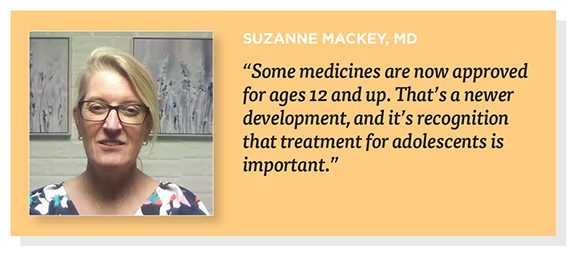 Weight Loss Medications
Weight Loss Medications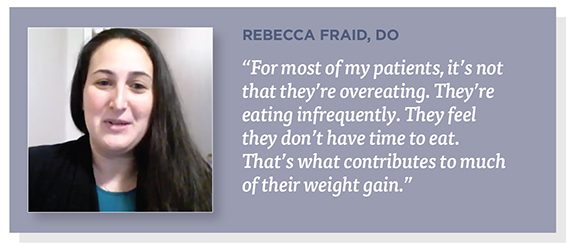 The patients they see
The patients they see Advice to parents of children with obesity
Advice to parents of children with obesity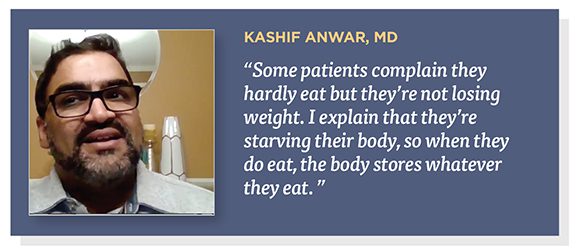 Lizzo & body positivity
Lizzo & body positivity Reality weight loss programs
Reality weight loss programs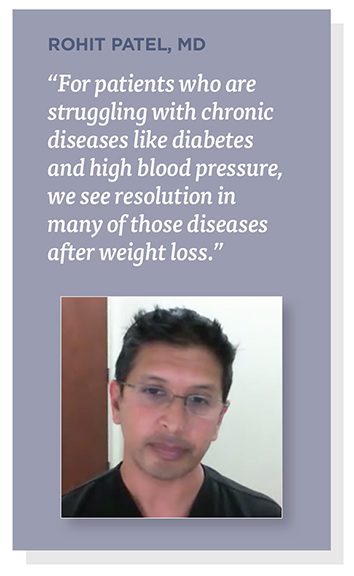 Diet or exercise – what’s most important?
Diet or exercise – what’s most important?










